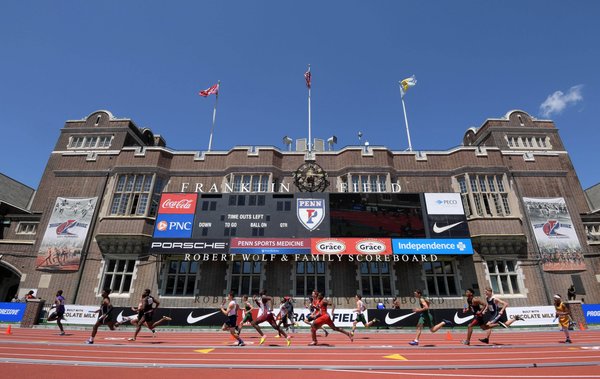When JTWO Films set out with a crew to document the 2019 Penn Relays, the team knew they were filming the 125th anniversary of the meet. But they had no idea that year's event would become significant for another reason — the track and field competition would be canceled in 2020 due to the COVID-19 pandemic, ending the Penn Relays' consecutive year streak that had start in 1895.
"It was the longest, consecutive-running sporting event in world history, actually, at the time one year longer than the modern-day Olympics, and then the pandemic happened and that was the last one," said Justin Jarrett, cofounder of JTWO Films, a production company in Old City. The meet did not take place in 2021 either, before returning for the 126th edition in 2022.
- MORE CULTURE
- Over a century before the Civil War, this radical Quaker agitated for an end to slavery
- Bradley Cooper buys $6.5 million farmhouse in New Hope
- On 'Hot Ones,' Quinta Brunson eats spicy wings while talking 'Abbott Elementary' and her favorite sitcoms
Each year, the multi-day track and field event is hosted by the University of Pennsylvania at Franklin Field. More than 15,000 athletes participate, ranging from elementary schoolers all the way up to the 80-and-older division.
From that 2019 trip, Jarrett has created "The Carnival: 125 Years of the Penn Relays," a 76-minute documentary that shows the history and the cultural impact of the Penn Relays. Ahead of 2024 Penn Relays on April 25-27, the film is being screened at the New Hope Film Festival, taking place April 5-14. The trailer can be watched online.
The documentary includes footage from the 2019 Penn Relays, interviews with past and present track-and-field stars like Carl Lewis, Renaldo Nehemiah, Greg Bell and Justin Gaitlin. Jarrett wrote and directed the film, and it is produced by broadcaster James Brown, host of "The NFL Today" on CBS, along with Travis Capacete.
The film shows the history of the sporting event, honing in on its ability to bring athletes together from across the country and the world — particularly how it transcends racial lines.
The Penn Relays have been racially integrated since their inception. This progressive stance on race among athletic competitions is attributed to the University of Pennsylvania's Quaker roots. The 2020 Penn Relays, had it happened, were scheduled to mark 100 years of participation by student athletes from the country's historically Black colleges and universities. The first women competed in the Penn Relays in 1962.
"I always felt that sports have the power to overcome a lot of issues that we face today in America," Jarrett said. "So whether it's segregation, racism, differences of opinion, in a pretty divided time, I've always thought of sports as the one unifier and it allows people to come together and put their differences aside and just compete or cheer for an athlete to do their best."
Bell, an Olympic gold medalist, in the film shares his experience competing in the event. Bell, who is Black, describes how while competing in the 1950s, there were many places where he wasn't allowed to eat, sleep or go see a movie, even though he was one of the top athletes in the United States.
"The rest of the country had certainly not progressed to the point that the Penn Relays had, which, if I needed another reason to love the Penn Relays, this would certainly justify it," Bell says.
Last year, the film was shown at international festivals, winning the Guirlande D'Honneur Sport and Society Award at the Milano International FICTS Festival World Championship Final, the Safinaz Foundation Award at the Kenya International Sports Film Festival and Best Feature Documentary at the Prisma Rome Independent Film Awards.
This year, in addition to the New Hope Film Festival, it will be screened at the Barcelona International Film Festival and the Beloit International Film Festival in Wisconsin.
Jarrett, who's always been a lover of sports, said he hopes the film can bring athletes and fans together.
"It was just so awesome to be to be able to play with that footage in the sandbox, try to pull some authentic, human stories out of it," he said, "and then put it in a context where people today could understand it and really see the power that sports has."

